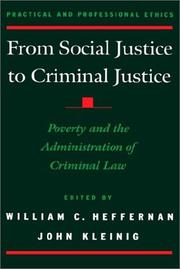| Listing 1 - 4 of 4 |
Sort by
|
Book
ISBN: 331943134X 3319431358 Year: 2016 Publisher: Cham : Springer International Publishing : Imprint: Palgrave Macmillan,
Abstract | Keywords | Export | Availability | Bookmark
 Loading...
Loading...Choose an application
- Reference Manager
- EndNote
- RefWorks (Direct export to RefWorks)
This book explains a paradox in American constitutional law: how a right not discussed during the ratification debates at Philadelphia and not mentioned in the text has become a core component of modern freedom. Rather, privacy is a constitutional afterthought that has gained force through modern interpretations of an old text. Heffernan defends privacy rights against originalist objections to its inclusion in modern constitutional doctrine, analyzes the structure of privacy claims, and provides a blueprint for protecting privacy against government incursion. The book will appeal to a wide audience of students and researchers of criminal procedure, constitutional history, law-and-society, and sociology of law. Lawyers will find this book extremely valuable in addressing the statutory issues associated with modern privacy law. At last, a book about constitutional interpretation that speaks plain English and makes sense. It’s the best work I know on the subject, yet that subject is not the one it’s mostly about. The book mostly tells the story of the constitutional right to privacy and how it emerged from provisions that at the outset were not much about privacy at all. On that subject, the book is definitive. It’s also fascinating, probing, engaging, insightful, and wonderfully presented. Privacy and the American Constitution is a stellar contribution to knowledge. Albert W. Alschuler, Julius Kreeger of Law and Criminology, Emeritus, University of Chicago A powerful and innovate contribution to constitutional law. Not only does Heffernan offer us a fascinating and persuasive account of how modern constitutional rights grew out of the personal space offered to us in an earlier era, he also explains why privacy rights deserve the newfound importance they have in our modern jurisprudence, based upon the same Madisonian approach to constitutional interpretation that justifies other central parts of modern constitutional law. Marc Jonathan Blitz, Alan Joseph Bennett Professor of Law, Oklahoma City University School of Law.
United States --- Constitutional law. --- Crime --- Criminology. --- Criminology and Criminal Justice. --- Criminological Theory. --- Constitutional Law. --- Crime and Society. --- US History. --- US Politics. --- History. --- Politics and government. --- Sociological aspects. --- Privacy, Right of --- Crime—Sociological aspects. --- United States-History. --- United States-Politics and gover. --- Constitutional law --- Constitutional limitations --- Constitutionalism --- Constitutions --- Limitations, Constitutional --- Public law --- Administrative law --- Social sciences --- Criminals --- Interpretation and construction --- Study and teaching --- United States—History. --- United States—Politics and government. --- Criminal sociology --- Criminology --- Sociology of crime --- Sociology --- Sociological aspects

ISBN: 1280472340 0195351584 1423760387 9781423760382 9780195351583 0195129857 9781280472343 0197730442 Year: 2000 Publisher: New York Oxford University Press
Abstract | Keywords | Export | Availability | Bookmark
 Loading...
Loading...Choose an application
- Reference Manager
- EndNote
- RefWorks (Direct export to RefWorks)
This volume of essays by well-known philosophers of law and political philosophers looks at the ethical difficulties inherent in this situation from a variety of perspectives.
Criminal justice, Administration of --- Social justice --- Administration of criminal justice --- Justice, Administration of --- Crime --- Criminal law --- Criminals --- Moral and ethical aspects --- Law and legislation
Book
ISBN: 9783031753978 3031753976 Year: 2025 Publisher: Cham : Palgrave Macmillan,
Abstract | Keywords | Export | Availability | Bookmark
 Loading...
Loading...Choose an application
- Reference Manager
- EndNote
- RefWorks (Direct export to RefWorks)
Book
ISBN: 3030127826 3030127818 9783030127824 Year: 2019 Publisher: Cham Springer International Publishing :Imprint: Palgrave Macmillan
Abstract | Keywords | Export | Availability | Bookmark
 Loading...
Loading...Choose an application
- Reference Manager
- EndNote
- RefWorks (Direct export to RefWorks)
This book seeks to explain why the concept of justice is critical to the study of criminal justice. Heffernan makes such a case by treating state-sponsored punishment as the defining feature of criminal justice. In particular, this work accounts for the state’s role as a surrogate for victims of wrongdoing—and so makes it possible to integrate victimology scholarship into its justice-based framework. In arguing that punishment may be imposed only for wrongdoing, the book proposes a criterion for repudiating the legal paternalism that informs drug-possession laws. Rethinking the Foundations of Criminal Justice outlines steps for taming the state’s power to punish offenders; in particular, it draws on restorative justice research to outline possibilities for a penology that emphasizes offenders’ humanity. Through its examination of equality issues, the book integrates recent work on the social justice/criminal justice connection into the scholarly literature on punishment, and so will particularly appeal to those interested in criminal justice theory. .
Criminal justice, Administration of --- Criminology. --- Critical criminology. --- Criminal justice, Administration of. --- Corrections. --- Punishment. --- Human rights. --- Criminological Theory. --- Critical Criminology. --- Criminal Justice. --- Prison and Punishment. --- Human Rights and Crime . --- Basic rights --- Civil rights (International law) --- Human rights --- Rights, Human --- Rights of man --- Human security --- Transitional justice --- Truth commissions --- Penalties (Criminal law) --- Penology --- Corrections --- Impunity --- Retribution --- Correctional services --- Administration of criminal justice --- Justice, Administration of --- Crime --- Criminal law --- Criminals --- Radical criminology --- Criminology --- Social sciences --- Law and legislation --- Study and teaching
| Listing 1 - 4 of 4 |
Sort by
|

 Search
Search Feedback
Feedback About UniCat
About UniCat  Help
Help News
News